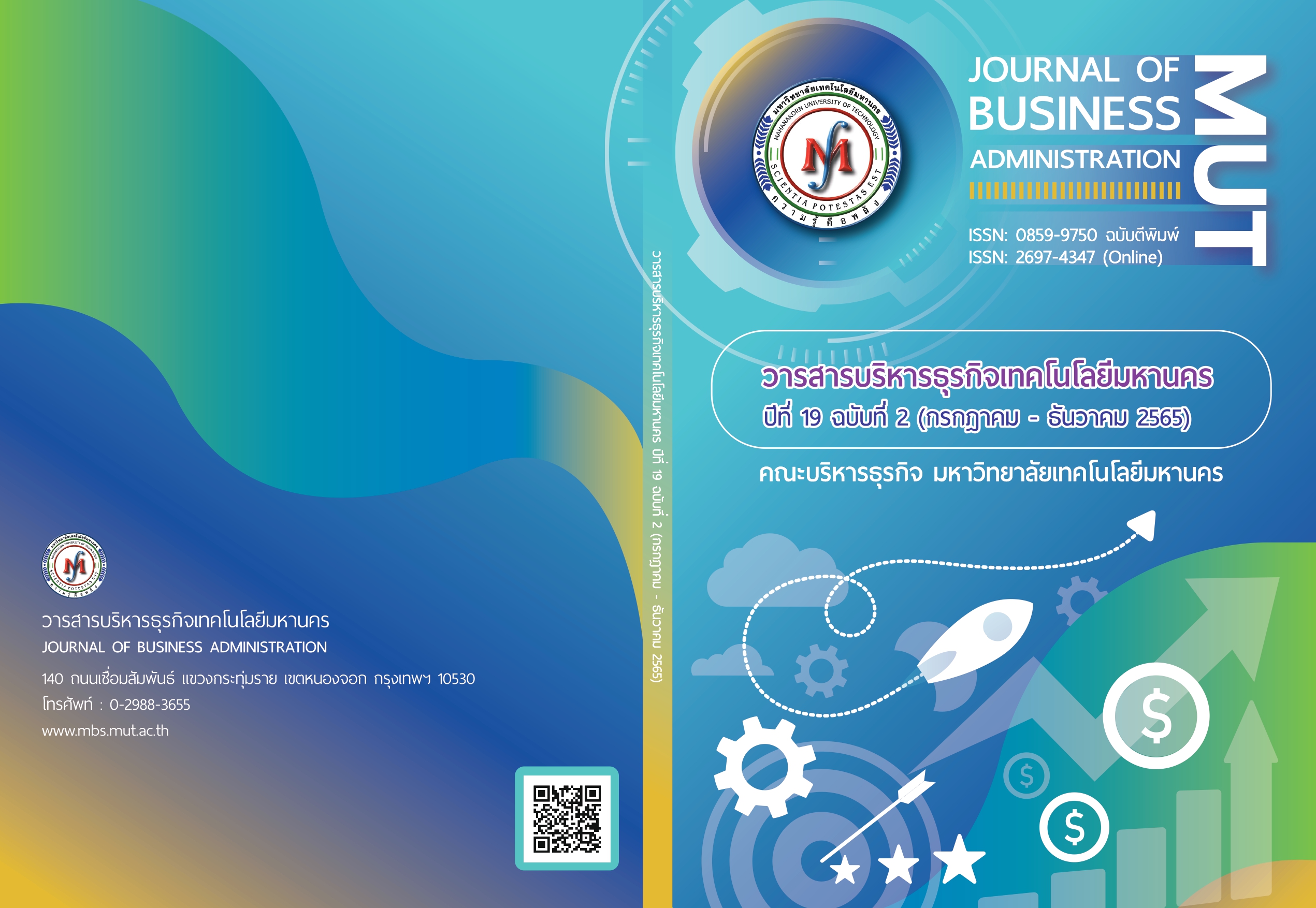The Study of the Antecedents and Consequences Model of Entrepreneurial Leadership of Startups Business in Thailand
Keywords:
Entrepreneurial leadership, Business success, Startups businessAbstract
The purpose of this academic article were to: 1) study the concept of antecedents and
consequences of entrepreneurial leadership on startups in Thailand, and 2) study a framework
and concept of antecedents and consequences of entrepreneurial leadership on startups in
Thailand based on the entrepreneurial leadership theory and the resource-based view theory
through the method of systemic review of national and international database. The results
showed that causal factors affecting the entrepreneurial leadership included strategic thinking,
human resource management, innovativeness and value creation. The consequences factor of
entrepreneurial leadership was the business success
References
Abdullah, Z., Ahsan, N. and Alam, S. 2009. The Effect of Human Resource Management
Practices on Business Performance among Private Companies in Malaysia.
International Journal of Business and Management. Vol. 4 (6), 65 - 72.
Ahmed, A. and Ramzan, M. 2013. A Learning and Improvement Model in Entrepreneurial
Leadership. IOSR Journal of Business and Management. Vol. 11 (6), 50 - 60.
Alomari, Z. 2020. Does human capital moderate the relationship between strategic thinking
and strategic human resource management?. Management Science Letters. Vol. 10,
- 574.
Altmann, M. and Correio, J. 2020. Adoption of key performance indicators in Brazilian
startups. Retrieved March 27, 2022 from
http://revistas.unilasalle.edu.br/index.php/desenvolve
Anwar, G. and Abdullah, N. 2021. The impact of human resource management practice on
organizational performance. International journal of Engineering, Business and
Management. Vol. 5 (1), 35 - 47.
Aslan, S., Diken, A. and Sendogdu, A. 2011. Investigation of the Effects of Strategic
Leadership on Strategic Change and Innovativeness of SMEs in a Perceived
Environmental Uncertainty. Procedia Social and Behavioral Sciences. Vol. 24,
– 642.
Banyhmadan, K., Muala, I., Ghalabi. R. and Adi, A. 2020. The Impact of Strategic Thinking on
Human Resources Development Strategy. International Journal of Innovation,
Creativity and Change. Vol. 14 (4), 1129 - 1141.
Barney, J. 1991 Firm Resources and Sustained Competitive Advantage. Journal of
Management. Vol. 17, 99 - 120.
Calik, E., Calisir, F. and Cetinguc, B. 2017. A Scale Development for Innovation Capability
Measurement. Journal of Advanced Management Science. Vol. 5 (2), 141 - 160.
Cavalcanti, A. 2018. A method for documenting the goal and KPIs of accelerators and
startups. Master’s Thesis. Carleton University.
Collis, J. 1994. Research note: How valuable are organizational capabilities. Strategic
management journal. Vol. 15 (8), 143 - 152.
Collis, J. and Montgomery, C. A. 1995. Competing on resources: Strategy in the 1990s.
Knowledge and Strategy. Vol. 73 (4), 25 - 40.
Costa, R. and Rezende, J. 2018. Strategic alignment of knowledge management and value
creation: implications on to an oil and gas corporation. RAUSP Management Journal.
Vol. 53, 241 - 252.
Dabic, M. Stojcic, N., Simic, M., Potocan, V., Slavkovic, M., and Nedelko, Z. 2021.
Intellectual agility and innovation in micro and small business: The mediating role of
entrepreneurial leadership. Journal of Business Research. Vol. 123, 683 - 695.
Deloitte Access Economics. 2020. Productivity is not an accident The economics and
impact of Victoria’s startups ecosystem. Retrieved February 7, 2022 from
Dvalidze, N. and Markopoulos, E. 2019. Understanding the nature of entrepreneurial
leadership in the startups across the stage of the startup lifecycle. Advances in
Human Factors, Business Management and Leadership. 281 - 292.
Gavett, G. 2017. The steep psychological price of starting your own company. Harvard
Business Review. Retrieved August 22, 2021 from https://hbr.org/2013/08/thesteeppsychological-price
Hongsirikarn, K. 2019. A Study of Successful Startup Leadership in Thailand. Dissertation
Doctor of Philosophy (Management). Bangkok: Siam University.
Islam, Z. 2015. Evolution of Human Resource Management and Its Impact on Organizational
Success. International Journal of Advance Research in Computer Science and
Management Studies. Vol. 3 (2), 301 - 309.
Khrutthamat, A., Chummee, P. and Sritong, C. 2021. Innovative Capability for The Digital
Startup Industry in Thailand: Cause and Effect. Journal of MCU Nakhondhat.
Vol. 8 (2), 395 - 410.
Kitpanich, P. 2021. The CLMVT startup-up and technology ecosystem. Focused and quick
(FAQ). Vol.186, 1 - 12.
Leelapornchai, P. 2017. The Success Factor of Knowledge Intensive Business (KIBS) in
Value Creation for Thailand Start up and SME. Master’s Thesis (Science
Technology Management). Bangkok: Thammasat University.
Leitch, C. and Volery. 2017. Entrepreneurial leadership: insights and directions. International
Small Business Journal. Vol. 35, 147 - 156.
Linderberg, M. and Krasnici, V. 2020. Strategic thinking in crisis management: A study
into how organizations use strategic thinking to overcome unusually demanding
situations. Master’s Thesis. UMEA university.
Ma, X. and Jiang, W. 2018. Transformational leadership, transactional leadership, and
employee creativity in entrepreneurial firms. The Journal of Applied Behavioral
Science, Vol. 54 (3), 302 - 324.
Mazla, M., Jabor, M., Tufail, K., Yakim, Amir. and Zainal, H. 2019. The roles of creativity and
Innovation in Entrepreneurship. Advances in Social Science, Education Humanities
Research. Vol. 470, 213 - 217.
Mehmood, M., Jian, Z., Akram, U. and Tariq, A. 2021. Entrepreneurial leadership: the key to
develop creativity in organizations. Leadership and Organization Development
Journal. Vol. 42 (3), 434 - 452.
Moon, B. 2013. Antecedents and outcomes of strategic thinking. Journal of Business
Research. Vol. 66 (10), 1698 - 1708.
Nafie, B. 2006. Investigation of the relationship between strategic thinking and
innovativeness of the management at the ministry of health in Gaza strip.
Master’s Thesis. The Isamic University-Gaza.
National Innovation Agency. 2021. Thailand Startup Ecosystem Report 2021. Retrieved
April 24, 2021 from https://govsupport.startupthailand.org/wpcontent/uploads/2021/10/
THAILAND-STARTUP-ECOSYSTEM-REPORT-2021.pdf
Okrah, J., Nepp, A. and Agbozo, E. 2018. Exploring the factors of startup success and
growth. The Business and Management Review. Vol. 9 (3), 229 - 237.
Ordu, U. 2020. Entrepreneurial leadership in start-up business. Bulgarian Comparative
Education Society. Vol. 18, 197 - 204.
Orakwu, A. and Iguisi, O. 2020. Conceptualizing entrepreneurship in human resource
management. Research in Business and Social Science. Vol. 9 (3), 85 - 93.
Park, J., Hu, L., Wu, C. and Hooke, A. 2014. Entrepreneurial leadership and innovativeness:
The mediating role of team psychological safety. Academy of Management Annual
Meeting Proceedings. 25 - 60.
Payne, A., Storbacka, K. and Frow, P. 2007. Managing the co-creation of value. Journal of
the Academy of Marketing Science. Vol. 36, 83 - 96.
Porter, M. E. 1990. The competitive advantage of nations. Harvard business review. Vol.
(2), 73 - 93.
Putsom, W. 2019. The effect of entrepreneurial leadership on value creation and
performance of automotive parts manufacturers businesses in Thailand. Doctoral
dissertation. Mahasarakham University.
Putsom, W., Suwannarat, P. and Songsrirote, N. 2019. Scale Development for Measuring
Entrepreneurial Leadership Competencies. Human Behavior, Development and
Society. Vol. 20 (3), 29 - 40.
Rasool, A., Ashrati, A. and Masood, S. 2018. HRM and Its effect on overall organization
performance. International Journal of Research in Management and Business
Studies. Vol. 5 (2), 20 - 23.
Renko, M., Tarabishy, A., Carsrud, A. and Brännback, M. 2013. Understanding and
measuring entrepreneurial leadership style. Journalof Small Business
Management. Vol. 53, 54 – 74.
Rompho, N. 2018. Operational performance measures for startups. Measuring Business
Excellence. Vol. 22 (1), 31 - 41.
Sarrami, S., KordnaeiF, A., Soltani, M., Yazdani, H. and Hajipour, B. 2020. Strategic sensemaking and value creation in SMEs. Utopía y Praxis Latinoamericana. Vol. 25 (6),
- 490.
Sawaean, F. and Ali, K. 2020. The impact of entrepreneurial leadership and learning
orientation on organizational performance of SMEs: The mediating role of innovation
capacity. Management Science Letters. Vol. 10, 369 - 380.
Siddiquee, Q., Jain, K. and Rajan, S. 2015. An approach to measure innovativeness of a
firm. The International Journal of Management. Vol. 4 (1), 25 - 37.
Startup Thailand. 2022. Startup Thailand Ecosystem. Retrieved August 29, 2022 from
https://ecosystem.startupthailand.org/browse
Swiercz, P. and Lydon, S. 2002. Entrepreneurial leadership in high-tech firms: a field study.
Leadershipand Organization Development Journal. Vol. 23, 380 – 389.
Tryon. 2021. Measuring the Relationship between Startup Success and Job Creation.
Retrieved January 15, 2022 from
https://smartech.gatech.edu/bitstream/handle/1853/64466/Measuring
%20the%20Relationship%20between%20Startup%20Success%20and%20Job%20Gro
wth%20Rates.pdf?sequence=1
Ueda, K., Takenaka, T., Vancza, J. and Monostori, L. 2009. Value creation and decisionmaking in sustainable society. CIRP Annals - Manufacturing Technology. Vol. 58,
– 700.
Uresha, K. and Opatha, H. 2020. Measuring Instruments for Human Resource Management
and Employee Happiness. Asian Journal of Social Sciences and Management
Studies. Vol. 7 (3), 180 - 187.
Wang, C. and Ahmed, P. 2004. The development and validation of the organizational
innovativeness construct using confirmatory factor analysis. European Journal of
Innovation Management. Vol 7 (4), 303 - 313.
Wernerfelt, B. 1995. The resource-based view of the firm: Ten years after. Strategic
Management Journal. Vol. 16 (3), 171 - 174.
Worraphongdee, N. 2017. Set Your Startup Business Guide. Bangkok: Thailand Securities
Institute The Stock Exchange of Thailand.
Zaech, S. and Baldegger, U. 2017. Leadership in start-ups. International Small Business
Journal. Vol. 35 (2), 157 - 177.
Downloads
Published
Issue
Section
License

This work is licensed under a Creative Commons Attribution-NonCommercial-NoDerivatives 4.0 International License.
ข้อความ ข้อคิดเห็น ข้อมูล เนื้อหา รูปภาพ แผนภูมิ แผนผัง เป็นต้น ที่ปรากฏและแสดงในบทความต่างๆ ในวารสารบริหารธุรกิจเทคโนโลยีมหานคร ถือเป็นความรับผิดชอบโดยตรงของผู้เขียนบทความนั้นๆ มิใช่เป็นความรับผิดชอบใดๆ ของวารสารบริหารธุรกิจเทคโนโลยีมหานคร และมหาวิทยาลัยเทคโนโลยีมหานคร
บทความที่ตีพิมพ์ในวารสารบริหารธุรกิจเทคโนโลยีมหานคร ถือเป็นลิขสิทธิ์เฉพาะของคณะบริหารธุรกิจ มหาวิทยาลัยเทคโนโลยีมหานคร หากบุคคลหรือหน่วยงานใดต้องการนำทั้งหมดหรือส่วนใดส่วนหนึ่งไปเผยแพร่ต่อหรือเพื่อกระทำการใดๆ จะต้องได้รับการอนุญาตเป็นลายลักษณ์อักษรจากคณะบริหารธุรกิจ มหาวิทยาลัยเทคโนโลยีมหานครก่อนเท่านั้น



